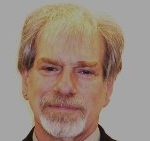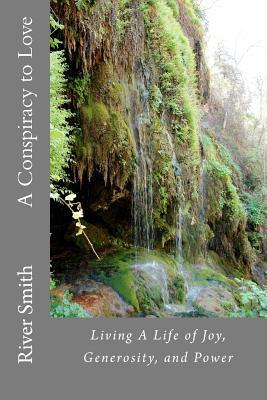Author: River Smith
Title: A Conspiracy to Love: Living A Life of Joy, Generosity, and Power
Publisher: Satyagraha/Liberation Brew
ISBN: 9780982926239
Pages: 217, Paperback/Kindle
Genre: Self-Improvement/Inspirational
Author Interview with River Smith
 Author Interview River Smith
Author Interview River Smith
A Conspiracy to Love: Living a Life of Joy, Generosity, and Power
Interviewed by: Jason Lulos, Pacific Book Review
Today we are with River Smith, author of the new book A Conspiracy to Love: Living a Life of Joy, Generosity, and Power. River, thank you for joining us.
RS: It’s my pleasure, Jason. I welcome the opportunity to talk about my work.
PBR: Your book is quite intellectually stimulating. Can you tell us, please, a bit of how you became interested in self-transformation?
RS: I’ve been so lucky. I’ve always been a happy person. Even as a child, I marveled at life, and I always liked people. My mother, who grew up in a terribly abusive home, and my father, who was labeled “slow,” and couldn’t read or write, taught me to be kind to people, to be generous with whatever I had. When I came face to face as a teenager with my institutionalized racism, and then a few years later, when I was fortunate enough to meet a couple feminist women who helped me begin to confront my sexism, it was really amazing. Being an ignorant nice guy wasn’t enough. I found the more I challenged myself to expand my vision of myself and the world, the better I felt. It became clear to me that the more I was willing to face the demons I had in any area of my life, the easier it was to turn my life into a learning, sometimes painful, growing, overall joyful experience. In my book and my other work I try to pass those lessons along.
PBR: Can you differentiate between assertive, confident people who are self-aware and those who are not?
RS: Well, Jason, I tend to stay away from absolute categories. I believe we’re all sort of in process. So, I’ve been working to be assertive for most of my life, but sometimes I’m not able to be. I’m generally a very confident person, but sometimes I’m not so confident. I believe that the more assertive we become, the more self assurance we develop. It’s so important to understand how to be effectively assertive. A big part of that is staying out of other people’s heads, and focusing on what we feel and what wewant. Then making it as easy as possible for the other person to accommodate us. No manipulation. No bullying. No guilting. Very effective. As you know, I go into a lot of detail in the book about this.
Self-awareness is a process, too. When I was twenty I thought I knew who I was. When I was thirty I realized how much I hadn’t known that I thought I did when I was twenty. The same thing happened when I was forty, and so on. It’s a great journey! If we grow up in extreme abuse of neglect, or a childhood is full of trauma, it is difficult stay in touch with ourselves, but it doesn’t take much—one person who sees something in us—a close friend, a single teacher, a mentor, a lover, a success we didn’t expect. Many things can pop open that door to self-awareness.
PBR: Is there a political philosophy that best facilitates the social transformations you describe?
RS: I consider my personal philosophy to be a form of eco-feminism. I celebrate women, and challenge the power structure in my head and in the culture that attempts to dominate and control that part of our species. I believe that the patriarchy, with its emphasis on violence, control, fear, disrespect for the earth, and rigid gender roles and hierarchy, has for the last four thousand or so years, distorted the human family’s place in the eco-system. Out of this has come a notion that the world is a very dangerous place that must be controlled and dominated. So, my path into dramatic social change is through challenging this process.
PBR: Could you kindly elaborate on “Partnership Cultures” in terms of individual and social grass roots strategies?
RS: I guess first it’s about celebrating all the aspects of humanity and our place in the larger family of Earth. There is the story of the Native American leader, who, when talking to a friend after he had met for a conference with European leaders, said, “We knew they weren’t serious when we saw that they had not brought their women.”
It’s paying attention to each individual because eachindividual’s contribution is critical in creating our collective wisdom. It means celebrating differences, and the contributions each of our experiences and conclusions can make to the whole. So process is critical in our activities. How we treat ourselves, and how we treat each other as we move through our activities is something we must continuously examine. It’s about minimizing hierarchy in our groups. No bosses and workers in the way we currently define them. No leaders and followers. No people who are always the teachers and others, always the students. Working on the premise that all knowledge is just our best considered conclusion at the moment. Always looking to move toward consensus in our group decisions.
PBR: You write about the self-transformation becoming social transformations. Is this limited to individuals, intimate relationships and social groups and/or what are your thoughts on global (or quantum) consciousness?
RS: The only thing I’m pretty certain about is that nothing stays certain. From the tiniest neutrino to the largest star, everything is moving, everything is changing. I believe I can have an effect on that change. I believe you can. So I think we’re engaged in this extraordinary revolution in consciousness which is inspired by the feminist and animal rights movements, but is, of course, all about what we do each day—how we treat ourselves: can we be generous, forgiving, and accepting of ourselves. As we succeed in this challenging process, we learn to see others with the same openness and acceptance. That then not only increases, but helps us to experience the love circulating around us all the time. Pretty soon, as we do this, we find that we begin to see more clearly what others see and experience, we become more sensitive to injustice, whether that’s to the circus elephant, the baby calf, or the worker next to us in the office, or down the street at the convenient store, or across the world in the garment factory. We LISTEN much more closely to the rhythms of all of life.
This is the revolution. For each of us to fully self transform, our consciousness and conscience must encompass all our relatives, in, on and above the earth, and any that might be out there in the great beyond or in other dimensions. If you bleed, I bleed. But it all begins with learning to be generous with ourselves.
PBR: Can sports like Mixed Martial Arts and video games such as Grand Theft Auto have a place, as entertainment, in the Partnership Cultures you describe?
RS: Whether it’s Riane Eisler’s partnership cultural transformation, or Frances Moore Lappe’s living democracy, or K. Louise Schmidt’s deep democracy, in all of these it will be an appreciation for all beings and all things that will guide us. It will be this “we” that influences each of our ideas, and together we will continue to shape our evolving culture. So, I’m not sure if there will be a place for such things. I do doubt it. There will be other kinds of things that excite us, and the focus on violence as sport will probably not have a place in such environments.
PBR: You mention the need to rewrite our cultural narrative. How would you redefine notions like success and power?
RS: As we’ve seen with many creative video games, we can create an exciting, challenging atmosphere that emphasizes healing, transforming environment respectfully, cooperatively creating. Right now we desperately need a great deal of healing. And as Bradshaw says, you cannot heal what you cannot feel. And, to paraphrase James Baldwin, we can’t feel, or change, what we can’t face. So, it’s about redefining courage to emphasize rigorous truth telling about ourselves and about those who have power over us. It’s about having faith that if we move out of our comfort zones, we will be sustained, and have the chance to become much more fulfilled as an individual and as a community member in this vibrant system. And, again, we become able to do that by making it a priority that we each be really generous with ourselves.
PBR: These ideas are all very interesting, and we wish you the best of success with your book. Thank you again for your time with us today.
RS: Oh, Jason, thank you. It has been a treat for me to have this conversation.
_____________________________________________________________________________________________________________________



Follow Us